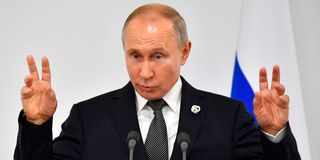How Kenya is proving freedom is backbone of democracy

Russian President Vladimir Putin. . For 200 days, his armies and mercenary corps have targeted the foundations on which our modern world is based – the international rules of law that make the globe work for all its inhabitants.
Demagogues and dictators love teaching history. Mystical golden eras help their political goals seem palatable.
Yet, as a historian, I know that strong societies aren’t built on poisonous disinformation or malevolent orthodoxies. They are built instead on the institutions that encourage free thinking.
Strong economies work because of the energy freedom gives the entrepreneur and his or her hustle, and the clarity that legal parameters provide.
There can certainly be disagreement. There can be discussion. Lots of it. And then there can be consensus. That is democracy’s ultimate strength – that it respects human nature, and builds with it, not over it.
Truly vibrant societies share inclusive visions of the future, the possible, the better.
This is what connects the war in Ukraine with the rest of the world. Tragically, the horrors and hardship experienced in my country are increasingly going to be felt across Africa and the world as energy prices continue to rise and food shortages create desolation – starvation caused only by one man’s decisions.
Beyond this, shared also is the potential destruction of freedom, the bedrock of all our lives. This is much more dangerous to humankind. This is what World War III looks like. The modern world is interconnected, and our pains are shared as much as our successes.
Since independence, Kenya has proudly stood as a beacon of hope for the idea that an entire continent of different peoples can peacefully and productively coexist.
This proud country has just experienced, not without its own challenges, the most important aspect of modern freedom – a democratic election.
All the nation’s estates – legislative, executive, judicial and media - played their part. Kenya’s success as a nation is built on working institutions.
Where the rules and parameters of behaviour are respected and adhered to – whether at an economic, commercial or personal level – the resulting order allows growth that spreads. Kenya is the powerhouse of East Africa, based on this foundation of freedoms.
Ambassador Martin Kimani showed a deep understanding of the implications and responsibilities of freedom at the UN Security Council (UNSC) on the day Vladimir Putin’s armies splintered the world order.
He spoke not just for Kenya but for the entire postcolonial world when he reminded the UNSC that young countries across Africa and the globe might still be at each other’s throats had they not decided together to seek a better future, together, through diplomacy and peace. Building on mutuality and dialogue, not murder and desolation.
However, Putin’s nightmarish hustle is to destroy international order. For 200 days, his armies and mercenary corps have not only exploded maternity wards and schools, they have targeted the foundations on which our modern world is based – the international rules of law that make the globe work for all its inhabitants.
Putin wants to snuff out the basics of human liberty in Ukraine. But in the process, he has a wider goal: to set a precedent for the death of democracy around the world. He wants this to be an emblem that freedom has been vanquished.
He wants to drag us all back to colonial times, with rule from afar by uncompromising dictatorships. If you see Putin’s boot print in Africa – uncharmingly left by his proxy “deniable” mercenary forces – you will see only chaos, environmental degradation, corruption, and murder. Kleptocrats flock to his table, eager to feast upon the poor and the weak anywhere in the world, with scant care for anything but themselves.
Reparations must be considered not only in my country, but across the whole of Africa, where Putin’s friends are busy. There will be millions of Africans forced into near starvation due to his invasion. And millions more lives damaged through his unchecked brigandry.
Russia’s invasion has once again divided the world into two camps: those who are willing to stand for freedom and the authoritarians who believe that might makes right. By firmly supporting three UN resolutions on Ukraine's freedom and territorial integrity Kenyans have chosen to be on the right side of history.
Now, as the impacts of Russia’s war bite even harder, it’s vital that Kenya continues to stand strong, to resist Putin’s bullying tactics and call for him to withdraw his forces from Ukraine and bring this war to an immediate end.
That is why I am travelling to Kenya later this month to meet with leaders across politics, business and civil society to understand better how Russia’s war has hit Kenyans and to explore how our two countries can better work together to stand up to the threat of tyranny.
- Dr Olexiy Haran is a professor of political science at the National University of Kyiv-Mohyla (UKMA) and research director at the Ilko Kucheriv Democratic Initiatives Foundation. Since 2002, he has served as founding director of the UKMA School for Policy Analysis.




